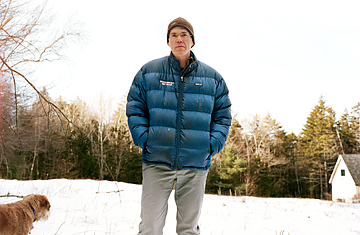
Booted up. McKibben loves his rural Vermont home, but climate activism keeps him on the road.
Bill McKibben misses winter. the 51-year-old environmental writer turned unlikely activist is marching through a frosting of snow outside his Vermont home, dodging the jabbing branches of spruce trees. McKibben has lived in and around the Adirondack and Green mountains since leaving New York City some two decades ago, and he remembers winters sunk "with a cold so deep, the trees would snap at night." But not this year. Scientists are already predicting that this winter could be the warmest in recorded history in the Northeastern U.S. In its place--thanks in part to man-made climate change--is something different and likely more dangerous. As McKibben walks through the woods, on land originally owned by the poet Robert Frost, he recalls the damage inflicted on Vermont by Tropical Storm Irene, one of 12 record-breaking billion-dollar disasters that hit the U.S. last year. "The climate has already warmed 1 [Celsius], and if this is what 1 produces, more warming is going to be impossible to deal with," he says. "We can't let this happen. We won't let this happen."
McKibben has been writing about climate change for more than two decades, and for years he waited for the U.S. to get serious about what he calls humanity's gravest threat. Finally, a few years ago, he grew tired of waiting and took action. With help from students at nearby Middlebury College, where he's a scholar-in-residence, McKibben launched 350.org a digital activist group that organized climate rallies across the world, making him one of environmentalism's most powerful voices. "Bill has helped turn this movement around," says environmentalist Paul Hawken.
Last year, McKibben helped lead bottom-up resistance to the proposed Keystone XL pipeline, which would have brought carbon-heavy Canadian oil-sands crude through the upper Midwest to U.S. refineries. Most insiders considered the pipeline a done deal, but McKibben and his allies drew thousands of protesters to the White House--where McKibben himself was arrested--and helped pressure President Obama to reject the pipeline in January.
McKibben understands that his work has only just begun. One rejected pipeline won't stop climate change. And the oil industry, along with its mostly Republican allies, is already fighting back hard, ready to make Obama pay in November. Critics say McKibben doesn't understand politics. He responds that you can't negotiate scientific fact. While he admits that his vision of an Internet-driven popular movement to save the planet might sound "naive," he also says nothing else has worked thus far. And time, he insists, is running out.
The Observer Gets Involved
McKibben's home suits the image of the quiet nature writer he was before becoming a star activist. An array of solar panels sits in his backyard--though McKibben's house isn't off the grid--and a 2003 Honda Civic hybrid rests in the garage. The house is heated by a wood-burning fireplace, supplemented with, as McKibben puts it, "sweaters." By the door is gear for cross-country skiing, a pastime that has left him with an endurance athlete's spare physique. A yellow lab dozing by the fireplace completes the tranquil scene.
